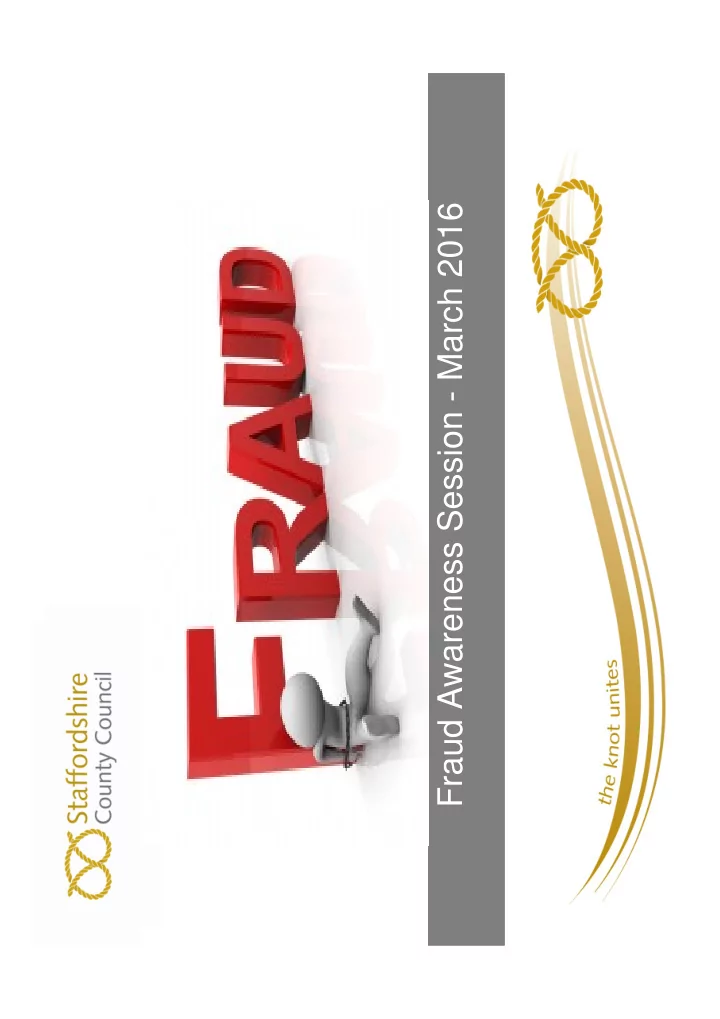

Fraud Awareness Session - March 2016
Aims and Objectives • To assess your understanding of what is a fraudulent act • To understand what is fraud, how it can arise and why it is important that organisations take action to mitigate the on-going threat of fraud • To raise awareness of the work undertaken by Internal Audit • To re-affirm Members’ Role in Council good governance
A strong Ethical Culture • Zero Tolerance to all forms of fraud. • Embedded suite of Counter fraud Policies/Procedures designed to promote high ethical standards:- i) Constitution, Financial Regulations and Procurement Regulations; ii) Members and officers Codes of Conduct; iii) Confidential Reporting (Whistle Blowing Policy); iv) Counter Fraud, Corruption & Bribery Strategy and guidance notes and Anti-Money laundering Policy; v) Effective Internal Audit Service.
Why does Fraud Matter? The annual fraud loss in the UK is estimated to be £ 52 billion . This includes losses of £20.5 billion in the public sector PubTax - £14bn lic Sector Fraud £20.5bn Central Government - £2.5bn Public Sector Fraud £20.5bn Local Government - £2.1bn Benefits - £1.9bn
Can we afford to ignore Fraud? That ‘lost’ £20.5 billion could fund 700,000 public sector staff !! Fraud can also lead to... • Reputational damage • Distrust • Poor morale • Higher taxes • More expensive public services • Funding for terrorism, drug gangs, child exploitation etc
Are these Fraudulent Acts? Which of the following would you consider to be a fraudulent act? 1. Working for another employer whilst off sick? 2. Inflating your working hours? 3. Over-claiming mileage and subsistence on travel expenses? 4. Purchasing goods via the Council’s ordering procedures for own personal use? 5. Falsifying existence of qualifications on job application forms?
What is Fraud? • “… a criminal activity where deception is used for • personal gain or to cause a loss.” There are three main ways of committing fraud, established by the Fraud Act 2006 Fraud by... False representation Failure to disclose information Abuse of position
Types of Fraud • The most common reported economic crime is asset misappropriation . • Other Types of Fraud include:- Abuse of Position; Recruitment Fraud; Procurement Fraud / Supply Chain Fraud; Bribery / Corruption; Cyber-Fraud / Cyber-Crime;
Fraud Happens…? • when the perpetrator spots an opportunity, has a motivation to commit fraud and feels able to justify their actions . Motivation • Pressure for results • Financial motives • Revenge ! Fraud Risk • I’ve earned it • Controls not functioning • No-one will • Staff changes / suffer Justification Opportunity losses • It’s a one-off • Tolerance The Fraud Triangle
How Does Fraud Come to Light? Internal & External Audit Staff changes Whistleblowing Confessions Technology Accidentally
Some of the Warning Signs of Fraud Suppliers & contractors... • requesting payment for goods before delivery • placing tender bids much higher or lower than others • submitting invoices on non-headed paper • notifying that their bank details have changed Colleagues... • being disdainful of procedures and controls • having a sudden change of lifestyle, or unexplained wealth • appearing withdrawn at work • reluctant to take holiday or a promotion • changing their work practices without authorisation
Fraud or Error? • It is important that we do distinguish between fraud and error. • Errors – Errors such as carelessness and /or incompetence resulting in records being in a state making it difficult to establish whether all assets can be accounted for, can be reduced by providing staff with knowledge, training, instructions and clear objectives.
Fraud In the News
What is Corruption and Bribery? • Corruption is the deliberate misuse of your position for direct or indirect personal gain. This includes offering, giving, requesting or accepting a bribe or reward which influences your actions or the actions of someone else. • The general criminal offences regarding bribery are defined by the Bribery Act 2010 and include: Personal offences – Bribing another person; Receiving a bribe; and Bribery of foreign public officials Corporate Offence – Failure to prevent bribery
Managing the risk of Fraud & Corruption • CIPFA Code of Practice - 5 key principles:- 1. Acknowledge the responsibility of the governing body for countering fraud and corruption; 2. Identify the fraud and corruption risks; 3. Develop an appropriate counter fraud and corruption strategy; 4. Provide resources (to implement the strategy); 5. Take action (in response to fraud and corruption).
CIPFA Code of Practice Acknowledge Identify Develop a Provide Take Risks Strategy Resources Action Recognise the Embedded Adopt Counter Appropriate Governance Threat of within Risk Fraud & level of framework Fraud Management Corruption resources which supports Strategy and skills counter Fraud Anti Fraud Evaluation of and Corruption Culture Fraud risk Proactive and Joint strategy exposure. Responsive working/data Governance Approach sharing reports and Publish Audit estimates of Responsibility Committee fraud losses & Role accountability
Audit Committee Responsibilities
Recent National Developments DCLG letter to all Local Authority Leaders • Local Government Counter Fraud & Corruption Strategy • Procurement Fraud • Debt Solutions – a joint venture • Non-benefit threat alert – City of London Police
Recommend
More recommend